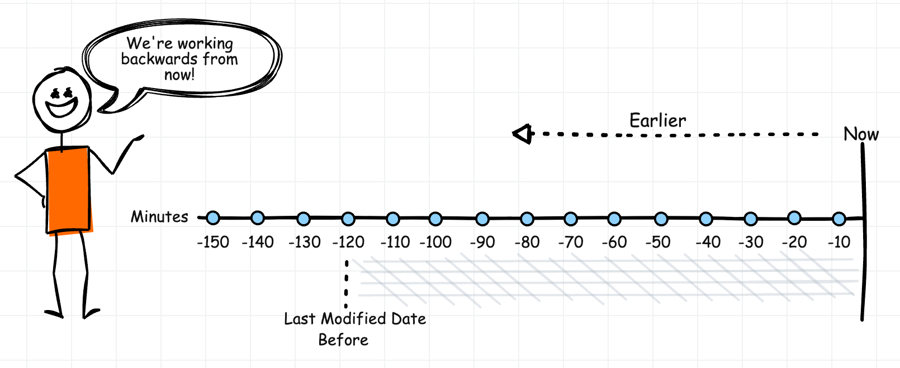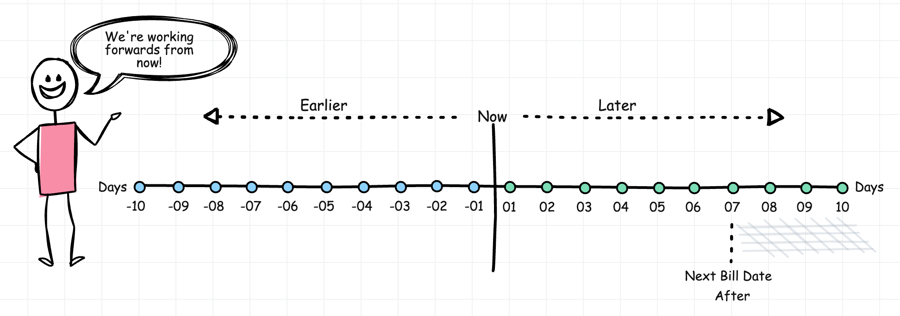Additional setup notes for NetSuite (services)
Introduction
This page includes additional information and resources that may be useful when configuring NetSuite in Patchworks:
Netsuite documentation
The following links to NetSuite's own documentation may be useful if you need to dig deeper into NetSuites fields (for example, to configure advanced mappings):
Patchworks filters
When you are pulling data from NetSuite, filters can be used to refine the data that is pulled. Available filter options vary, depending on which entity type is being synced (for example: orders, products, customers, etc.).
For general information about working with filters in Patchworks, please see our service filters page.
Time period filters
A common scenario for filters is to process records created/modified in the last x minutes/hours/days, or within a given timeframe. For NetSuite, these filter fields are:
Date created
Date modified
In this scenario, we're dealing with events that have occurred in the past, so Patchworks filters are defined to work back from 'now'.
Example
Let's say that we only want to process all orders which were modified in the last 2 hours. In the Patchworks dashboard, our filters would look as follows:

We can visualise this as below:

Currently, it's not possible to add the same filter field twice, therefore you cannot define a start and end timeframe.
NetSuite also includes a range of time period filters that deal with events that may occur in the future - for example: due date, ship date, expected close date, next bill date, etc. In this scenario, filters are defined to work forwards from 'now'.
Example
Let's say that we only want to process all orders where the next bill date is 7 days or more ahead. In the Patchworks dashboard, our filters would look as follows:

We can visualise this as below:

Currently, it's not possible to add the same filter field twice, therefore you cannot define a start and end timeframe.
Special options when pulling data from NetSuite
When you choose to add NetSuite as a data source, you're prompted to provide details for a set of standard options which are common to all source connectors, irrespective of the system being used.
In addition, depending on the entity being synced, some NetSuite-specific source options may be required. These options are summarised below:
-
-
-
Special options when pushing data to NetSuite
When you choose to add NetSuite as a data destination, you're prompted to provide details for a set of standard options which are common to all destination connectors, irrespective of the system being used.
In addition, depending on the system you're pulling data from and the entity being synced, some NetSuite-specific destination options may be required. These options are summarised below.
Customers
async
Not currently used. This is a placeholder setting for a future concurrency feature.
Fulfilments
async
Not currently used. This is a placeholder setting for a future concurrency feature.
Orders(Orders)
async, threaded, concurrency limit
These options utilise NetSuite's concurrency feature. Please see our NetSuite concurrency page for details.
Orders(Orders)
Send customer deposit
Enables the creation of 'customer deposit' records linked to the sales order in NetSuite. You should only enable this setting if you are sending order payments to NetSuite.
OrdersRebound(Orders)
async, threaded, concurrency limit
These options utilise NetSuite's concurrency feature. Please see our NetSuite concurrency page for details.
OrdersRebound(Orders)
Send customer deposit
Enables the creation of 'customer deposit' records linked to the sales order in NetSuite. You should only enable this setting if you are sending order payments to NetSuite.
Products(Products)
record type
There are many kinds of 'product' records in NetSuite - this value tells Patchworks what type of records to create. InventoryItems is the most typical product type used. If you use anything different, make sure that your field mappings are adjusted accordingly.
Products(Products)
async
Not currently used. This is a placeholder setting for a future concurrency feature.
Stocklevels(Stock)
async
Not currently used. This is a placeholder setting for a future concurrency feature.
Inventory Levels
async
Not currently used. This is a placeholder setting for a future concurrency feature.
Webhook Orders
async, threaded, concurrency limit
These options utilise NetSuite's concurrency feature. Please see our NetSuite concurrency page for details.
Webhook Orders
Send customer deposit
Enables the creation of 'customer deposit' records linked to the sales order in NetSuite. You should only enable this setting if you are sending order payments to NetSuite.
Orders (Orders)
async, threaded, concurrency limit
These options utilise NetSuite's concurrency feature. Please see our NetSuite concurrency page for details.
Orders (Orders)
Send customer deposit
Enables the creation of 'customer deposit' records linked to the sales order in NetSuite. You should only enable this setting if you are sending order payments to NetSuite.
Products(Products)
record type
There are many kinds of 'product' records in NetSuite - this value tells Patchworks what type of records to create. InventoryItems is the most typical product type used. If you use anything different, make sure that your field mappings are adjusted accordingly.
Products(Products)
async
Not currently used. This is a placeholder setting for a future concurrency feature.
Customers
async
Not currently used. This is a placeholder setting for a future concurrency feature.
API endpoints
If you're an advanced Patchworks user and ever need to work with NetSuite API endpoints, be aware that they are case sensitive.